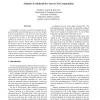Free Online Productivity Tools
i2Speak
i2Symbol
i2OCR
iTex2Img
iWeb2Print
iWeb2Shot
i2Type
iPdf2Split
iPdf2Merge
i2Bopomofo
i2Arabic
i2Style
i2Image
i2PDF
iLatex2Rtf
Sci2ools
129
click to vote
ICTAI
2007
IEEE
2007
IEEE
Adaptive Lookahead for Answer Set Computation
Lookahead is a well-known constraint propagation technique for DPLL-based SAT and answer set solvers. Despite its space pruning power, it can also slow down the search, due to its high overhead. In this paper, this twofold effect is analyzed. On one side, we give characterizations of the problems for which the cause for the reduction of search efficiency shows clearly. On the other we show that problem instances that lie in the phase transition regions often significantly benefit from the use of lookahead. Our analysis leads to a proposal of adaptive lookahead, which performs lookahead according to the learned information during the search. Adaptive lookahead is implemented in one of the best-known answer set solvers, smodels. Our experiments show that adaptive lookahead adapts well to different search environments it is going through.
Adaptive Lookahead | Adaptive Lookahead Adapts | Answer Set Solvers | Artificial Intelligence | ICTAI 2007 |
Related Content
| Added | 03 Jun 2010 |
| Updated | 03 Jun 2010 |
| Type | Conference |
| Year | 2007 |
| Where | ICTAI |
| Authors | Guohua Liu, Jia-Huai You |
Comments (0)

